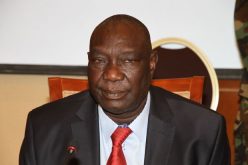 NY Times, Dallas — Thomas Eric Duncan, 42, the patient with the first case of Ebola diagnosed in the United States and the Liberian man at the center of a widening public health scare, died in isolation at a hospital here on Wednesday, hospital authorities said.
NY Times, Dallas — Thomas Eric Duncan, 42, the patient with the first case of Ebola diagnosed in the United States and the Liberian man at the center of a widening public health scare, died in isolation at a hospital here on Wednesday, hospital authorities said.
Mr. Duncan died at 7:51 a.m. at Texas Health Presbyterian Hospital, more than a week after the virus was detected in him on Sept. 30. His condition had worsened in recent days to critical from serious as medical personnel worked to support his fluid and electrolyte levels, crucial to recovery in a disease that causes bleeding, vomiting and diarrhea. Mr. Duncan was also treated with an experimental antiviral drug, brincidofovir, after the Food and Drug Administration approved its use on an emergency basis.
“The past week has been an enormous test of our health system, but for one family it has been far more personal,” Dr. David Lakey, the commissioner of the Texas Department of State Health Services, said in a statement. “Today they lost a dear member of their family. They have our sincere condolences, and we are keeping them in our thoughts.”
The mayor of Dallas, Mike Rawlings, also offered some assurance to Dallas residents. “I remain confident in the abilities of our health care professionals and the medical advances here in the U.S.,” Mr. Rawlings said, “and reassure you we will stop the Ebola virus in its tracks from spreading into our community.”
After Mr. Duncan arrived at the Dallas/Fort Worth International Airport on Sept. 20, he set off a chain of events that raised questions about health officials’ preparedness to detect and contain the deadly virus. His case spread fear and anxiety among those he encountered, however briefly, and turned the places, vehicles and items he touched into biohazardous sites that were decontaminated, dismantled, stored or, in some cases, incinerated.
Mr. Duncan went to the airport in Liberia on Sept. 19 for his flight to the United States, landed in Dallas the next day and first went to the emergency room at Texas Health Presbyterian Hospital feeling ill on Sept. 25. He was released by the hospital, which had failed to view him as a potential Ebola case for reasons that remain unclear. He returned there and was admitted Sept. 28 after his condition worsened.
Mr. Duncan spent nearly two decades separated from the woman he had traveled to Dallas to be with, Louise Troh, 54, with whom he had a son. The couple were apparently rekindling their relationship. Yet in the last days of Mr. Duncan’s life, Mr. Duncan and Ms. Troh remained more apart than together. Each had been quarantined because of the risk of spreading Ebola, Mr. Duncan in virtually his own hospital ward and Ms. Troh in a four-bedroom home on a remote property that state health officials prohibited her, her 13-year-old son and two others from leaving, under threat of prosecution.
Mr. Duncan had been a driver at a cargo company in Monrovia, the Liberian capital, living alone in a small room he rented from the parents of Marthalene Williams, 19. A simple act of kindness probably exposed him to the virus that has killed more than 3,000 people in West Africa. In Monrovia, neighbors and Ms. Williams’s parents said Mr. Duncan helped the family take Ms. Williams to and from a hospital on Sept. 15, shortly before she died of Ebola. Some of the men and women who had direct contact with Ms. Williams, and who were also in contact with Mr. Duncan, have also died, including Ms. Williams’s brother, Sonny Boy Williams, 21.
Mr. Duncan helped carry her while she was sick with the virus and convulsing. The disease is contagious only if the infected person is experiencing active symptoms.










